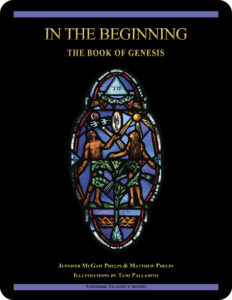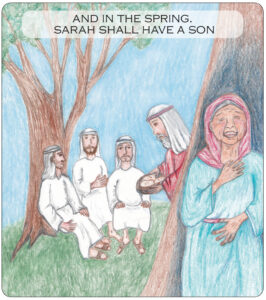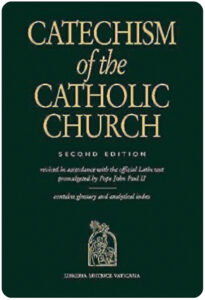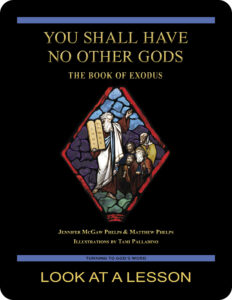 In the Beginning:
In the Beginning:
The Book of Genesis
Lesson 10 God’s Covenant with Abraham
the book of Genesis 17:1—18:33
Revised Standard Version Catholic Edition (RSVCE)*
New American Bible Revised Edition (NABRE)*
Catechism of the Catholic Church
ex libris (in our library)
cross references in the book of Genesis
next lesson: The Destruction of Sodom & Gomorrah
This material coordinates with Lesson 10 on pages 56–61 in the study book In the Beginning: The Book of Genesis.
“And God saw everything that he had made, and behold, it was very good. And there was evening and there was morning, a sixth day. Thus the heavens and the earth were finished, and all the host of them. And on the seventh day God finished his work which he had done, and he rested on the seventh day from all his work which he had done.”—the book of Genesis 1:31—2:2
welcome to our in-depth study of the book of Genesis
We invite interested groups and individuals to check out the sample first lesson from this 28-lesson  Turning to God’s Word Catholic Bible study.
Turning to God’s Word Catholic Bible study.  These online study pages link to our free lesson video overviews as well as to a list of cross references in the biblical text. Other study aids include maps, charts, illustrations, additional commentary, and prayers based on the primary Scripture in each lesson. In the Beginning: The Book of Genesis has been granted an imprimatur and can be purchased from our website shop. If you have a Bible-study question or comment, click on one of the “ask us your question” or “what do you think” buttons on any online study page.
These online study pages link to our free lesson video overviews as well as to a list of cross references in the biblical text. Other study aids include maps, charts, illustrations, additional commentary, and prayers based on the primary Scripture in each lesson. In the Beginning: The Book of Genesis has been granted an imprimatur and can be purchased from our website shop. If you have a Bible-study question or comment, click on one of the “ask us your question” or “what do you think” buttons on any online study page.
open with prayer
It’s always wise to begin any Bible study with prayer, whether reading the Scriptures alone or meeting with others in a discussion study group. You can pray using your own words or use one of the opening prayers on our website. We especially like the following:
Lord Jesus, you promised to send your Holy Spirit to teach us all things.
As we read and study your word today,
allow it to touch our hearts and change our lives. Amen.
let’s review—the book of Genesis 15:1—16:16
In Lesson 9 Abram Questions the Lord GOD, something happens that most present-day Christians find moderately alarming—Abram displays impatience about having no heir and questions God. God responds with assurances that Abram will indeed become a father to innumerable descendants. This satisfies Abram, and Scripture records that Abram “believed the LORD,” and that God considered Abram’s trust evidence of righteousness. God and Abram enter into an important covenant in which God expands on his previous promises to Abram and assumes all responsibility for ensuring that what’s been promised comes to pass. The sixteenth chapter of the book of Genesis describes how Abram’s wife Sarai deals with her impatience over not having any children by encouraging Abram to conceive a child with her maid Hagar. After this happens, Hagar’s attitude cause Sarai to treat her harshly, and Hagar flees. She encounters an angel, however, who instructs her to return and prophesies that her son Ishmael “shall dwell over against all his kinsmen.”
a funny thing happened …
 This illustration by Turning to God’s Word co-founder Tami Palladino of Sarah laughing points to God’s often overlooked determination that Sarah is to be the mother of the heir of the covenant. It’s relatively easy to see the importance of Abraham to God’s plan. While Sarah—along with other women in the Old Testament—is acknowledged as a matriarch of the faith, scholars traditionally treat her role as secondary to that of Abraham’s. Why might God be insistent that Sarah become the mother of Abraham’s primary heir? Considering Sarah’s age, her motherhood is a funny prospect. What might have motivated Sarah to lie about laughing at that thought? Click on the illustration (right) to enlarge it. Tami’s original illustration is on page 59 in the study book In the Beginning: The Book of Genesis.
This illustration by Turning to God’s Word co-founder Tami Palladino of Sarah laughing points to God’s often overlooked determination that Sarah is to be the mother of the heir of the covenant. It’s relatively easy to see the importance of Abraham to God’s plan. While Sarah—along with other women in the Old Testament—is acknowledged as a matriarch of the faith, scholars traditionally treat her role as secondary to that of Abraham’s. Why might God be insistent that Sarah become the mother of Abraham’s primary heir? Considering Sarah’s age, her motherhood is a funny prospect. What might have motivated Sarah to lie about laughing at that thought? Click on the illustration (right) to enlarge it. Tami’s original illustration is on page 59 in the study book In the Beginning: The Book of Genesis.
 Abram & Sarai get some visitors (27:39)
Abram & Sarai get some visitors (27:39)
In the seventeenth chapter in the book of Genesis, God reiterates his covenant with  Abram, whom he now names Abraham. He also renames Sarai to Sarah, and the LORD introduces the idea of circumcision—not something humans likely would think to do on their own. Because everyone associated with Abraham agrees to be circumcised, it’s clear that Abraham was held in high regard. In the eighteenth chapter, God appears at Abraham’s tent in the form of three strangers, who foretell that in a year Sarah will have a son. Sarah overhears and is amused. Abram again questions the LORD, this time regarding how many righteous people it will take to
Abram, whom he now names Abraham. He also renames Sarai to Sarah, and the LORD introduces the idea of circumcision—not something humans likely would think to do on their own. Because everyone associated with Abraham agrees to be circumcised, it’s clear that Abraham was held in high regard. In the eighteenth chapter, God appears at Abraham’s tent in the form of three strangers, who foretell that in a year Sarah will have a son. Sarah overhears and is amused. Abram again questions the LORD, this time regarding how many righteous people it will take to  stave off God’s plan to destroy Sodom. Turning to God’s Word author Matthew Phelps asks that we consider how that exchange foreshadows a foundational understanding about Christianity. The videos for this study are being redone and will be posted as they become available. The original videos for Lessons 4 through 28 will remain accessible until then.
stave off God’s plan to destroy Sodom. Turning to God’s Word author Matthew Phelps asks that we consider how that exchange foreshadows a foundational understanding about Christianity. The videos for this study are being redone and will be posted as they become available. The original videos for Lessons 4 through 28 will remain accessible until then.
The Scripture ranges for the videos being redone to accompany this Catholic Bible study from Turning to God’s Word will match the Scripture ranges for the sets of questions in the study book In the Beginning: The Book of Genesis. Viewers will be able to follow along as author Matthew Phelps discusses Lesson 10, “God’s Covenant with Abraham,” on pages 56–61 in the study book.
a multitude of nations
An interesting discrepancy occurs between the language used in the book of Genesis 17:5 and that used in the book of Genesis 17:16. Abraham is told that he’ll become the father of a multitude of nations, while Sarah is to become the mother of nations. In this way God acknowledges Ishmael as Abraham’s son, and Ishmael’s descendants as descendants of Abraham.
Moving forward, the Old Testament will focus on only one branch in the line of Abraham. Things begin to change in the New Testament. In the Gospel According to Matthew 3:9, John the Baptist indicates that he has little concern for the hereditary claims of the Pharisees and Sadducees: “Do not presume to say to yourselves, ‘We have Abraham as our father’; for I tell you, God is able from these stones to raise up children to Abraham.” In the final book of the New Testament, the book of Revelation 7:9 significantly discloses “a great multitude which no man could number, from all tribes and  peoples and tongues, standing before the throne and before the Lamb.” You can learn more about this great multitude in Lesson 8 Salvation Belongs to Our God and Lesson 20 The Mighty Voice of a Great Multitude, both in the Turning to God’s Word Catholic Bible study The Revelation of Jesus Christ: The Faithful Witness.
peoples and tongues, standing before the throne and before the Lamb.” You can learn more about this great multitude in Lesson 8 Salvation Belongs to Our God and Lesson 20 The Mighty Voice of a Great Multitude, both in the Turning to God’s Word Catholic Bible study The Revelation of Jesus Christ: The Faithful Witness.
 circumcision—you could look it up in our archives
circumcision—you could look it up in our archives
The sign of God’s covenant with Abraham shows up in the New Testament in Stephen’s speech in the Acts of the Apostles 7:51. To learn more about the word “circumcision,” read Lost in Translation, an online column in which Turning to God’s Word author Matthew Phelps helps readers connect with ideas expressed in the original languages of the Scriptures. New Lost in Translation entries are posted on Mondays, and past entries are archived on our website. Contact us if you’d like to receive Lost in Translation by email every week.
the Old Testament Trinity
The eighteenth chapter in the book of Genesis switches back and forth, sometimes referring to Abraham’s visitors in the plural and sometimes in the singular. This language fluke is just one indication of why they’ve come to be referred to as the Old Testament Trinity. Can you think of other reasons?
WHAT DO YOU THINK it means to be blameless?
In the book of Genesis 17:1, God sets forth the terms of his covenant with Abram: “I am God Almighty; walk before me, and be blameless.”
? Why do you think it is that God now asks that Abram be blameless?
? Is there any biblical evidence to support the idea that Abram hasn’t been behaving in a blameless manner prior to this point in his life?
? Consider what it means to be blameless before God.
? Thinking about the inherent difficulties involved in being blameless before God, why do you suppose that God asked this of Abram?
? Do you think that God continues to desire blamelessness from the people who enter into covenant with him?
? What might be the most common problem standing in the way of present-day Christians being blameless before God?
? What are some of the barriers standing in the way of you being blameless before God?
? What can you do today to overcome or eliminate those barriers?
 pray with the Psalms—new moon festival
pray with the Psalms—new moon festival
The idea of walking with a blameless heart shows up later in the Old Testament in Psalm 101, in which the Psalmist vows to walk with a blameless heart, a tall order. Prayed at Thursday Lauds (Week II), Psalm 101 inspired the title (as well as the illustration by Turning to God’s Word co-founder Tami Palladino) for Lesson 24 I Will Walk with Blameless Heart in the Turning to God’s Word Catholic Bible study Sing a New Psalm: Communicating with God Through the Prayers of the Church—Volume I: Lauds & Vespers.
t he best Catholic commentary about Scripture
he best Catholic commentary about Scripture
To find out more about how Church teaching is supported by Scripture passages in In the Beginning: The Book of Genesis, check out the Index of Citations in the Catechism of the Catholic Church. Links (Revised Standard Version Catholic Edition [RSVCE*]) to the primary Scripture passages in the lesson and relevant paragraphs in the Catechism are provided here. Not every passage in the biblical text for this Catholic study is referenced in a Catechism paragraph, however.
the book of Genesis 17:1–2—paragraph 2571
the book of Genesis 17:4–8—paragraph 1819
the book of Genesis 17:5—paragraph 49
the book of Genesis 18:1–15—paragraphs 706, 2571
the book of Genesis 18:10–14—paragraph 489
the book of Genesis 18:14—paragraphs 148, 276
the book of Genesis 18:16–33—paragraph 2571
the book of Genesis 18:20—paragraph 1867
to learn more, read more Scripture
If you’re having difficulty with a particular passage of Scripture, it can be helpful to read the relevant  cross references—but looking these up can take time. To make that easier, we’ve compiled the cross references from the Revised Standard Version Second Catholic Edition (RSV2CE)—the translation that we reprint in our study books. That list can be found at the top of every online study page, and it includes links to cross references in the primary biblical text for In the Beginning: The Book of Genesis.
cross references—but looking these up can take time. To make that easier, we’ve compiled the cross references from the Revised Standard Version Second Catholic Edition (RSV2CE)—the translation that we reprint in our study books. That list can be found at the top of every online study page, and it includes links to cross references in the primary biblical text for In the Beginning: The Book of Genesis.
don’t forget about our indexes & extra online material

 If you’re trying to locate information about a specific Scripture passage, you can look it up in the index at the back of the study book or sample lesson. If you want to find a particular commentary, you can look up its title in the topics index. To learn more about another book of the Bible for which there’s a Turning to God’s Word study, visit the online study directories to read the commentaries and watch any accompanying videos. Finally, if you have a question or would like to make a comment about any of our studies, you can use one of the “ask us your question” or “what do you think” buttons to email our authors.
If you’re trying to locate information about a specific Scripture passage, you can look it up in the index at the back of the study book or sample lesson. If you want to find a particular commentary, you can look up its title in the topics index. To learn more about another book of the Bible for which there’s a Turning to God’s Word study, visit the online study directories to read the commentaries and watch any accompanying videos. Finally, if you have a question or would like to make a comment about any of our studies, you can use one of the “ask us your question” or “what do you think” buttons to email our authors.
ex libris—Church documents & books about religious topics
Link to magisterial documents referred to in our Bible studies at ex libris—magisterial documents.  This listing includes significant recent encyclicals as well as a number of historical Church documents. Recommended books related to Scripture study can be found at ex libris—main bookshelf.
This listing includes significant recent encyclicals as well as a number of historical Church documents. Recommended books related to Scripture study can be found at ex libris—main bookshelf.
wondering how to pronounce some of these words?
The following link is to a reading from the New International Version (NIV) Bible. To listen, open the link and click on the audio icon above the printed text. Although not taken from the translations used in our study materials, the NIV reading provides an audio guide to pronunciation of words in this lesson’s primary biblical text. A close online version of the translation of the Bible used in Catholic liturgy in the United States as well as an audio guide for daily Mass readings for the current month can be found on the website of the United States Conference of Catholic Bishops (USCCB).
the book of Genesis 17:1—18:33 (NIV)
 close with Bible-based prayer related to this lesson
close with Bible-based prayer related to this lesson
Many of our Catholic study groups like to conclude their discussions with a prayer based on the scriptural focus of their lesson, and some participants include Scripture-specific prayer in their individual study. If you’re uncomfortable composing your own Bible-based prayers, you can follow our four easy steps. If you prefer, you can use the following prayer based on this lesson’s text from the book of Genesis.
O loving and faithful God,
you help us to pursue lives of blamelessness.
Grant that our desire to please you
may be motivated by love for you and your Son, Jesus Christ,
who serves as our model of perfect love
and stands ready to help us at all times. Amen.
Lesson 11 The Destruction of Sodom & Gomorrah—the book of Genesis 19:1–38
Lesson 9 Abram Questions the Lord GOD—the book of Genesis 15:1—16:16
you also may like our study of the book of Exodus
 You Shall Have No Other Gods: The Book of Exodus, a 28-lesson Catholic Bible study with an imprimatur, provides an in-depth look at how significant events in biblical history that occurred thousands of years ago to descendants of Jacob remain relevant and even critical for present-day Christians to understand. The deliverance of the Hebrews from slavery in Egypt and the giving of Ten Commandments are examined along with the development of Moses’ relationship to God. Click on the book’s cover to view a sample lesson.
You Shall Have No Other Gods: The Book of Exodus, a 28-lesson Catholic Bible study with an imprimatur, provides an in-depth look at how significant events in biblical history that occurred thousands of years ago to descendants of Jacob remain relevant and even critical for present-day Christians to understand. The deliverance of the Hebrews from slavery in Egypt and the giving of Ten Commandments are examined along with the development of Moses’ relationship to God. Click on the book’s cover to view a sample lesson.
start a Turning to God’s Word Bible study
 Thank you for your interest in our study In the Beginning: The Book of Genesis.
Thank you for your interest in our study In the Beginning: The Book of Genesis.  Information about beginning a Turning to God’s Word Catholic Bible study can be found at start a Bible study. Tami, Matthew, and I are available to answer questions and offer support. Contact us if you’d like to start a Turning to God’s Word study or have your schedule listed with other TtGW study groups on our website. —Jennifer
Information about beginning a Turning to God’s Word Catholic Bible study can be found at start a Bible study. Tami, Matthew, and I are available to answer questions and offer support. Contact us if you’d like to start a Turning to God’s Word study or have your schedule listed with other TtGW study groups on our website. —Jennifer
*There are seven deuterocanonical books in the Old Testament—the Books of Tobit, Judith, Wisdom, Sirach, Baruch, and First and Second Maccabees, as well as some passages in the Books of Esther and Daniel. Protestants usually refer to these works as “apocryphal,” a word that means “outside the (Protestant) canon” because they’re excluded from most Protestant Bibles. The word “deuterocanonical” means “second canon”; Catholics use that word to refer to any section of the Catholic Old Testament for which there are no extant, or existing, Hebrew manuscripts. All of the deuterocanonical books appear in the Septuagint, the earliest remaining versions of which date to the 1st century B.C. This Greek translation of the Old Testament was in common use by Jews at the time of Jesus—but the same books aren’t found in existing Hebrew manuscripts, which aren’t as old as the oldest version of the Septuagint. Learn more by reading How Do Catholic & Protestant Bibles Differ?
Turning to God’s Word printed Bible studies use the 2006 Revised Standard Version Second Catholic Edition (RSV2CE) translation for all Scripture references except those to the Psalms, which are taken from The Abbey Psalms and Canticles, prepared by the Benedictine monks of Conception Abbey and published in 2020 by the United States Conference of Catholic Bishops (USCCB). All Scripture links for the online study pages for In the Beginning: The Book of Genesis are to the 1966 Revised Standard Version Catholic Edition (RSVCE) translation. The New International Version (NIV) audio recordings follow the same chapter and verse numbering as the RSV Catholic translations, but the NIV translation doesn’t include the deuterocanonical books and passages.
The 1966 RSVCE uses archaic pronouns and verb forms such as “thee,” “thou,” “didst” in the Psalms and in direct quotations attributed to God. The 2006 RSV2CE replaces those with more accessible English. The few significant translation changes in the RSV2CE include rendering almah as “virgin” in the Book of Isaiah 7:14 and restoring the term “begotten” in the Gospel According to John 3:16.
Numbering varies for some passages in this Bible study. Turning to God’s Word studies (print and digital) follow the numbering in the Revised Standard Version Catholic translations (RSV2CE and RSVCE). Discrepancies in the New American Bible Revised Edition (NABRE) are noted in the Index of Scripture Citations in the study book and the online sample.
 You can learn more about the Psalms by viewing a sample lesson from the Turning to God’s Word Catholic Bible study Sing a New Psalm: Communicating with God Through the Prayers of the Church—Volume I: Lauds & Vespers. The second part of that study, Sing a New Psalm: Communicating with God Through the Prayers of the Church—Volume II: Vigils, Day Prayer & Compline, is scheduled for publication in 2025. Some verse numbers may vary in different translations of the Psalms.
You can learn more about the Psalms by viewing a sample lesson from the Turning to God’s Word Catholic Bible study Sing a New Psalm: Communicating with God Through the Prayers of the Church—Volume I: Lauds & Vespers. The second part of that study, Sing a New Psalm: Communicating with God Through the Prayers of the Church—Volume II: Vigils, Day Prayer & Compline, is scheduled for publication in 2025. Some verse numbers may vary in different translations of the Psalms.
